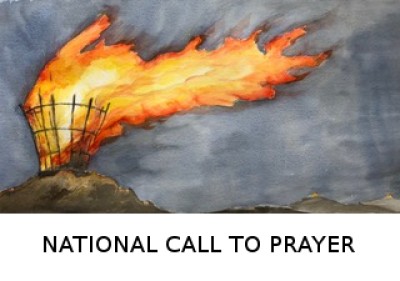Algeria: opportunities for Christianity
14 Feb 2019The 41 million people of this Muslim-majority country depend on fossil fuels for their export income. Recently finances have been hurt by the drop in oil prices, prompting cuts in state subsidies. Algeria struggles to provide jobs and homes for its people. Democracy and human rights exist on paper, less so in reality. In the midst of this, people are coming to Christ. Most new believers are from non-Arab backgrounds, but faith is also growing among Arabs and other people groups. New fellowships begin as believers move into Arab areas to share the gospel. Persecution is a fact of life. One Christian woman wrote, ‘Women converts to Christ face challenges which sometimes cost them dearly - rejected by their families, repudiated by their husbands, deprived of their children.’
Democratic Republic of the Congo: Ebola outbreak
14 Feb 2019The second-largest Ebola outbreak in history has killed 97 children, and 811 people have symptoms. ‘We are at a crossroads’, said a spokesperson for Save the Children. ‘If we don't take urgent steps to contain this, the outbreak might last another six months, if not the whole year.’ The fatality rate is currently 63%. There is misinformation in communities, and mistrust of medical responses is an urgent and real concern. People have disrupted funerals because they didn't believe the deceased had the virus. Aid workers are threatened because it is believed that they spread Ebola. ‘We must scale up our efforts to reach the vocal youth and community leaders to build trust and to help us turn this tide. Treating sick people is essential, but stopping Ebola from spreading is just as important.’ Children are at the greatest risk of dying.
Syria: Iranian missile factory
14 Feb 2019Iran has built a new precision missile factory in the outskirts of Latakia, a port city in Syria near the Russian air force base. The Syrian government and Hezbollah reportedly assisted Iran in constructing the factory. Missile parts were ordered from Italy, China, and other Asian countries, through companies established by Syria’s scientific research centre. Meanwhile, Iran’s official news agency reported a new ballistic missile with a range of 1,000 kilometres to celebrate the 40th anniversary of the Islamic Revolution. In September 2018 Israel Defence Forces issued a rare statement confirming they struck a Syrian military facility near Latakia ‘from which systems to manufacture accurate and lethal weapons were about to be transferred on behalf of Iran to Hezbollah in Lebanon’.
Iran forty years on
14 Feb 201911 February marked the 40th anniversary of Iran’s revolution, ending a 2,500-year monarchy and creating the world’s first Islamic republic - now a complex and contradictory regime. Iran is a democracy trapped inside a theocracy - holding genuinely competitive elections, but candidates are selected by unelected clerics and lawyers. Large public demonstrations are common. Iranian women protest in the streets and online against strict female dress. Moderate president Hassan Rouhani has had his reforms undermined by the Supreme Leader. With President Trump re-imposing US sanctions, recession looms and inflation rises. An anti-West stance remains an essential element of Iran’s politics. Public frustration over economic hardship; a Supreme Leader aged 79; and uncertainty over succession. How strong is this republic?
USA: risking all to cross the border
14 Feb 2019President Trump calls the ‘migrant caravan’ an invasion of the USA. . A desperate 2,600-mile walk from Honduras with children and a few possessions is an odd invasion. Honduras has suffered much since President Hernández’s fraud-marred re-election in 2017. As resistance to him persists, scores are killed by government security forces. Also gangs and drug trafficking cause one of the highest rates of homicide. Some are fleeing not because of crime or political oppression, but because of economic inequity and lack of opportunity. Scripture says we should care for the widow, the orphan, and the stranger. Pope Francis said, ‘It is hypocrisy to call yourself Christian and chase away refugees, those seeking help, someone who is hungry or thirsty. If I say I am Christian, but do these things, I am a hypocrite.’
Malaysia: Open Doors urges action
14 Feb 2019In 2017 Pastor Raymond Koh was abducted in a professional attack caught on CCTV. He has not been seen since. Open Doors has urged the government to throw its weight behind locating him and three others who disappeared around the same time. They said, ‘The facts of this case are utterly outrageous. We urge the new government to expose the truth behind these abductions, and root out the corruption which allegedly led to their disappearance.’ A whistle-blower said Raymond had been targeted for having a minority faith, and his abduction was carried out with the approval of the then inspector general of police. A human rights commission investigation into his disappearance ended in December 2018, with a response expected in March 2019.
Myanmar: kidnapped pastor could be dead
14 Feb 2019On 19 January, in Myanmar, Pastor Tun was kidnapped with several others and held captive by a group of Buddhist militants. He is believed to be dead, but Barnabas’ contacts in the region say that his body has not yet been found. Pastor Tun was a spokesman for his village, and his missionary work made him a target by the ‘truly brutal’ group. Concerns are mounting that more abductions of Christians are likely.
A NATIONAL CALL TO PRAYER - 28 MARCH 2019
13 Feb 2019As Christians working in government, members of Christians in Government, we, like many others, have recently felt a strong sense that Christians need to come together, whatever our views, to pray for God’s Will for our nation. We are therefore inviting Christians across the nation to join us in a National Day of Prayer on 28 March 2019.
This is inspired by a vision of all the prayers across our nation. These may be small or large groups, in homes, villages or churches – but all are connected and are lighting up our nation like a Christmas tree with lights shining all over it. And we believe, at this key time for our nation, the King, our Lord, calling His tribes, the many denominations, and groups, to come together and seek His will for our nation.
We believe there is power in unity and we want to show the UK that the church is alive and cares about our nation; that God has answered prayers in the past for the UK, and He can do it again! And we would love to pray for God, to be our Good Shepherd of Psalm 23, to guide, comfort and bless the UK at this key time in our history.
Therefore, whatever your views, your denomination, wherever you are in the UK, we invite you to be part of this National Call to Prayer, to bring people together to pray for our nation.
We would love for you to join us! You are warmly invited to pray individually, and to mobilise your friends and communities to pray for our nation, and to join events in London, Edinburgh, Cardiff, and Belfast, or to host events in every town and village across the UK for a NATIONAL DAY OF PRAYER on Thursday 28th March 2019. To sign up to host an event, please go to our website: www.nationalcall2prayer.com







